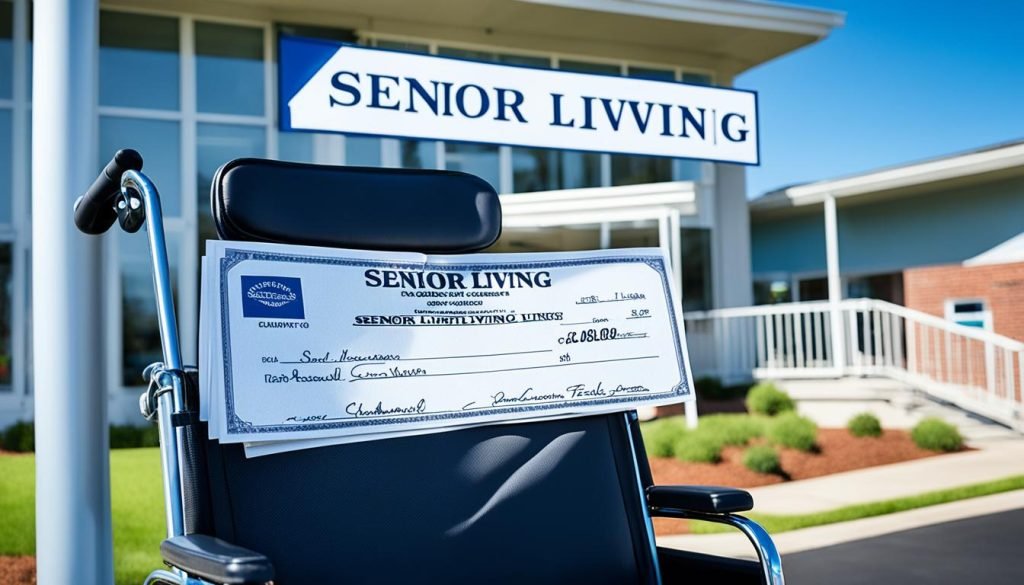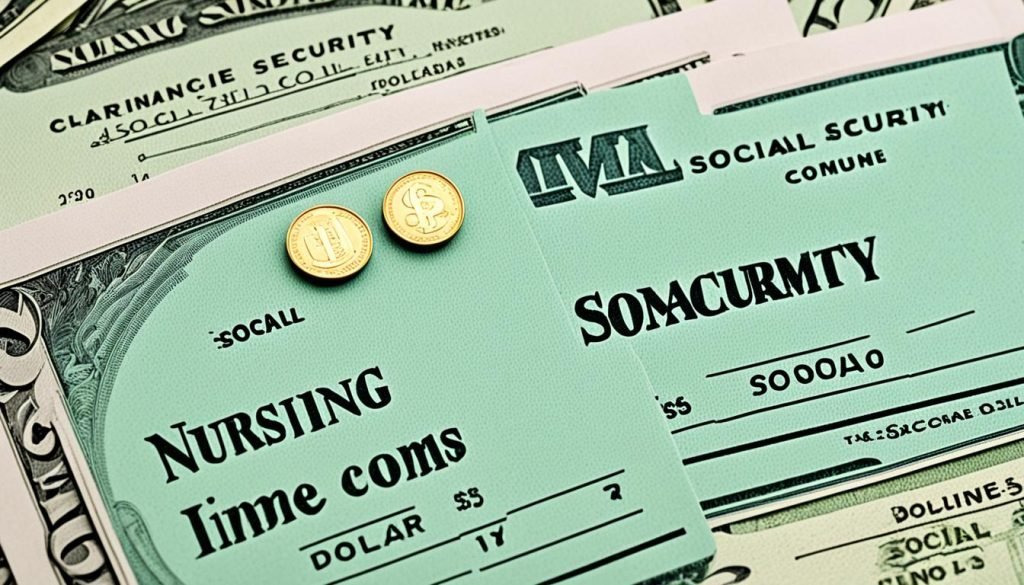Many families in the U.S. worry about how to pay for nursing home care. They wonder if nursing homes take Social Security checks. The short answer is no, nursing homes do not automatically take these checks.
Those who need a nursing home might have someone else managing their benefits. If Medicaid is paying over half of the cost, the Social Security benefits might drop to $30 a month1. But, some benefits can be saved, like if you’re in a nursing home for under 90 days. You need to fill out a form (SSA-186) and have a doctor agree1.
The real issue is that nursing home care is very expensive. It costs over $9,000 a month for a private room2. For most people, Social Security payments aren’t enough. They have to look for other ways to pay for nursing home care3.
Understanding Social Security Benefits in Nursing Homes
Figuring out social security and nursing homes can get tricky. Knowing what benefits are available and who can get them is key. These payments help a lot with the costs of living for older folks.
Types of Social Security Benefits
There are many kinds of social security benefits for seniors. The regular ones are based on how much you earned during your life. They can make up almost half of what older adults live on after they stop working2. The usual amount people get each month is around $1,767.032.
Then there’s help for those with little money who are disabled. This benefit is called Supplemental Security Income (SSI). The typical monthly payment for folks 65 and over is $1,0332. Many people get help from both kinds of benefits to get by.
Eligibility Criteria for Social Security Benefits
There are special rules to get these benefits. For the regular Social Security ones, there’s no limit on how much money you can have or own. What matters is how long you’ve worked4. Most folks can start getting this help at 62, but waiting longer means bigger monthly checks.4
But for the SSI benefits, the amount you can make and what you own are big factors. If Medicaid takes care of most of a nursing home bill, your SSI could drop to $30 a month5. If both you and your spouse are getting help, that benefit might drop too. Instead of each getting $1,191, they might only get $7945.
How Social Security Payments Are Handled in Nursing Homes
Using Social Security income in nursing homes needs good planning. Seniors often like paying via direct deposit. It’s easy and safe.
Direct Deposit Arrangements
Most nursing homes and social security programs like direct deposit. This means the money goes straight to the nursing home’s account, if allowed. It makes payments on time and efficiently, ensuring the resident’s care is never late.
Role of Representative Payees
Some folks find it tough to manage their Social Security in care homes. In these situations, a Representative Payee helps. The law says people like minors or those who can’t manage their own money, need this help4. A Rep Payee handles the Social Security money. They make sure the nursing home bill gets paid, whether a family member or a chosen organization.
The Social Security office gives strict rules for Rep Payees. This keeps the person’s rights safe and the money used correctly4.
Learning to handle social security in care homes well is really important. It shows why using direct deposits and Rep Payees is best. This way, the residents get the proper care they need.
What Nursing Homes Charge and How Social Security Fits In
It’s important for seniors and their families to understand nursing home care costs. The fees for these homes are often high. This influences how Social Security support helps pay for elder care.
Average Costs of Nursing Home Care
A semi-private room in a nursing home costs around $7,908 monthly. For a private room, the cost goes up to $9,034 every month2. These prices show the importance of planning your finances carefully.
Comparing Costs: Private Room vs Shared Room
Deciding between a private and shared room affects expenses greatly. Choosing a shared room saves you about $1,126 per month2. Even with lower costs, Social Security won’t cover much, only about 21% for a shared room and 18% for a private room2.
Partial Coverage by Social Security
On average, Social Security helps with $1,767.03 a month2. This doesn’t pay for most of the nursing home costs, whether you choose a private or semi-private room2. So, it’s key to look for other ways to fund care.
Since nursing homes are costly and Social Security doesn’t cover everything, seniors need to mix funding sources. This mix might include state or federal help, personal savings, or long-term care insurance2.
“It’s important to know the roles that Social Security, Medicaid, and other assistance programs play in covering nursing home expenses.”
Understanding nursing home costs and Social Security helps families plan for elder care financially.
Do Nursing Homes Take Your Social Security Check?
The issue of nursing homes taking your Social Security check varies widely. Nursing homes usually don’t take it automatically3. However, they can use your Social Security income to help pay for long-term care expense3.
In a private nursing home, the monthly cost can top $8,0003. Seniors rely on Social Security benefits for about 50% of their income between ages 60 to 893. Yet, the average benefit of $1,691.53 may not cover the full cost of care3.
Medicaid may cover more than half of nursing home costs, limiting SSI to just $30 a month1. Sometimes, people can’t get SSI if they’re medically confined. It’s vital to know about these rules for your case1.
If you need care for 90 days or less, Medicaid allows you to keep the full SSI if you fill out Form SSA-1861. This can help a lot with short-term needs.
Memory care facilities cost about $5,400 a month, and assisted living is around $4,5003. Social Security often covers up to 21% of these costs3. But, extra funding is still needed to fully pay for care3.
It’s crucial to understand how Social Security and Medicaid affect your care costs3. Knowing the rules can help ensure you get the right support in your situation3.
Supplemental Security Income (SSI) and Nursing Home Care
Supplemental Security Income (SSI) is very important for older adults with low incomes. It helps those who have few assets. SSI is different from regular Social Security. It doesn’t need you to have worked a long time. But, it looks at how much money you have and your current living situation to decide how much you get. This is key for planning for senior care expenses.
How SSI Differs from Traditional Social Security
There’s a big difference between traditional Social Security and SSI for nursing home residents. Social Security payments are based on your past earnings. But SSI is for those who don’t have many finances. It also includes extra help like state payments in some places6.
SSI Payment Adjustments in Nursing Homes
In nursing homes, SSI payments can change. If Medicaid pays over half of the care costs, SSI drops to $30 a month for one person1. This small amount helps with extra costs. But, it’s not enough to cover all nursing home expenses. If a couple gets SSI and lives in a nursing home, they might only get $60 a month together6.
But, some folks still get full SSI if they’re in a medical place for under three months. They need a doctor to agree it’s a temporary stay1. In some places, SSI recipients get extra help. For example, people in personal care homes in Pennsylvania can get up to $1,582.30 each month6.
Knowing about Social Security and SSI is really important if you’re in a nursing home. This information helps you make smarter choices about money. It’s vital to plan well, understanding how your living situation affects your SSI payments.
Navigating Medicaid, Medicare, and Other Assistance Programs
It’s key for seniors to know about different assistance programs for nursing home care. Each program has its own rules, what it covers, and any limits. I’ll explain Medicaid, Medicare, and VA benefits. This will help you figure out what support might be available to you or someone you care about.
Medicaid Coverage for Nursing Home Care
Medicaid is crucial for seniors who need long-term nursing home care and have financial need. In Florida, for example, a single person can’t have over $2,000 in assets to qualify, and married couples $156,0007. There’s also an income limit of $2,829 per month (gross). Medicaid looks at the last 5 years to check if assets were given away unfairly7. But, not all nursing homes accept Medicaid. This can make it hard to find a home even if you qualify for assistance.
Medicare’s Role in Nursing Home Costs
Medicare helps with short stays in nursing homes but not long-term care. For long-term care, people need to look for other ways to pay. This is why it’s important to understand Medicare’s limits. It can help you plan ahead for your care needs better.
VA Benefits and Long-Term Care Insurance
Veterans might get help from the VA for nursing home costs and other care. These benefits can make nursing care more affordable for veterans. Long-term care insurance can also help. It’s a good idea for seniors to check their insurance policies to see what’s covered.
Let’s look at how everything stacks up with this table:
| Program | Coverage | Eligibility | Notes |
|---|---|---|---|
| Medicaid | Long-term care, Personal care | Income and asset limits, 5-year look-back | Not all facilities accept Medicaid7 |
| Medicare | Short-term care | Based on medical necessity | Does not cover long-term8 |
| VA Benefits | Various eldercare services | Veteran status | Can significantly reduce costs |
| Private Insurance | Long-term care | Policy-specific | Review policy for details |
Knowing about these programs and their rules can make financing long-term care easier. It’s smart to look into all the help you can get, from Medicaid to VA benefits. This way, you can make sure you or your family member gets the care and help they need.
Alternative Funding Options for Nursing Home Care
When programs like Social Security fall short, finding other ways to fund nursing home care is crucial. Using personal savings, retirement funds, and selling property can help bridge the gap. Many families rely on these to ensure their loved ones get the care they deserve.
Personal Savings and Retirement Funds
For many, dipping into personal savings or retirement is the first step. Experts recommend using retirement funds early, understanding they are a solid financial backup. By combining different types of IRAs, families may reduce their tax burden when medical expenses are high9. This approach helps cover costs without sacrificing essentials.
Selling Property or Reverse Mortgages
Another option is to sell property. Families might downsize or sell a home to fund care. Reverse mortgages offer a different route by providing cash from home equity without needing to sell. This can supplement income and help meet nursing home care costs.
Thoroughly researching these options is key to making the best choice. Seeking advice from financial experts or those specializing in eldercare can shed light on effective asset management. This way, families ensure their loved ones are cared for while minimizing financial strain.
Handling Financial Shortfalls in Nursing Homes
When seniors don’t have enough money for nursing home care, they need to find solutions. This is to make sure they can live comfortably without worrying about costs.
Combining Multiple Income Sources
To cover the high costs of nursing homes, it helps to mix various income streams. This includes Social Security payments, savings from retirement, and maybe money from other assets. The total cost of care can be more than $10,000 a month10, which is a lot higher than what Social Security usually pays.
For veterans, there are VA benefits that can help a lot. They can give significant financial support, with payments up to $2,727 a month for some. Making use of all income opportunities is key to managing costs.
Reaching Out for Financial Assistance
Getting help with eldercare costs often means looking into specific aid programs. Medicaid, for instance, has financial limits but can be a big help. For those in Florida, there’s a monthly income cap and certain asset limits10. Meeting these criteria can open the door to significant aid.
There are also non-profit and government aid programs for eldercare. However, you need to plan carefully. This is because Medicaid checks financial moves you’ve made in the last five years. They might question big asset transfers. Such moves can affect your eligibility for help11.
Conclusion
When it comes to nursing home care, Social Security plays a big role. It helps cover some of the costs. While nursing homes won’t take the whole check, it’s not enough to pay the full amount. In 2021, the costs are high, with a private room at $8,910 and a semi-private at $7,800 monthly12. This means people need to look into other money sources too.
For care finances, look beyond just Social Security. Include SSI and Medicaid. SSI pays up to $914 if eligible, or $1,371 for a couple, which is still not enough12. Medicaid, if you qualify, could pay all nursing home costs. But, you must meet strict rules12. If your income is under $2,563 in many states, you might get Medicaid help. This can pay for care, drugs, and more12.
It’s wise to check other ways to pay for eldercare. This includes Medicare and VA benefits for some services4. Also, use savings, retirement money, or long-term care insurance. These extra steps can fill the money gap and make your plan stronger. It shows how informed choices about money can lead to better eldercare coverage. This approach is key to a well-rounded eldercare financial plan.
Source Links
- https://www.ssa.gov/ssi/spotlights/spot-temp-institution.htm
- https://www.aplaceformom.com/caregiver-resources/articles/will-social-security-cover-nursing-home-costs
- https://seniorcareaz.com/2023/08/29/does-social-security-pay-for-nursing-homes/
- https://www.ssa.gov/phila/PDF/nursinghomes.pdf
- https://www.dirkwinklerlaw.com/what-happens-to-your-social-security-when-you-go-to-a-nursing-home/
- https://www.ssa.gov/pubs/EN-05-11150.pdf
- https://www.dhclaw.com/library/how-to-pay-for-florida-nursing-home-care-with-medicaid.cfm
- https://www.nursenextdoor.com/blog/medicaid-home-health-care-florida/
- https://www.rolekretirement.com/post/protecting-assets-from-nursing-home-costs-in-pa
- https://www.dhclaw.com/blog/ways-to-pay-for-the-nursing-home-in-florida.cfm
- https://www.investopedia.com/articles/personal-finance/081915/5-ways-protect-pensions-nursing-homes.asp
- https://smartasset.com/retirement/how-to-pay-for-nursing-home-care-with-social-security









